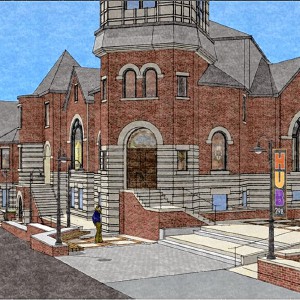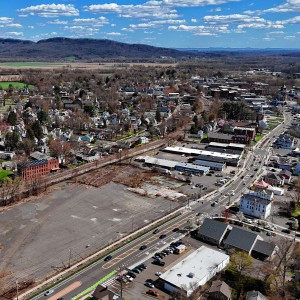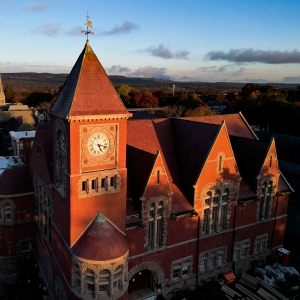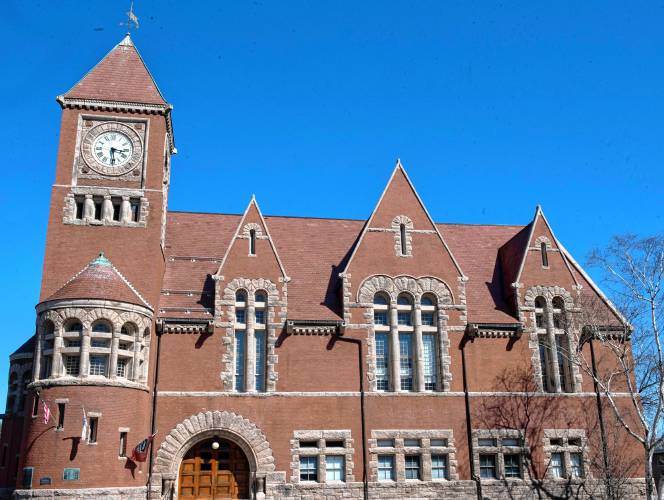School backers press council for boost to Amherst regional budget
| Published: 04-02-2024 4:20 PM |
AMHERST — Parents, educators and members of the Regional School Committee are making direct appeals to the Amherst Town Council to support a $35.75 million fiscal year 2025 budget that is nearly $1 million above the financial guidance provided by Amherst officials last fall.
On Monday evening at the Town Room at Town Hall, following a brief rally of about 20 school supporters led by the Amherst Pelham Education Association outside the building, interim Superintendent Douglas Slaughter, joined by Regional School Committee Chairwoman Sarahbess Kenney and Amherst School Committee Chairwoman Sarah Marshall, formally requested the higher budget designed to prevent the loss of 15 teaching positions and preserve almost all personnel who interact with students at the middle and high schools.
“At school committee, our job is to approve a budget that supports our students the best we can and honors our district mission,” Kenney said, explaining that many cuts in the original $34.81 million budget were student-facing. That prompted the committee members to ask Slaughter to put these positions back in, while allowing some cuts, such as to clerical and custodial staff.
Slaughter said the budget is $747,896 less than what would be needed to provide level services, restoring $941,975 in spending to keep the 15 positions. The budget, as presented, would mean an 8.2% increase in Amherst’s assessment, to $19.23 million, or $1.46 million more than this year’s $17.77 million assessment.
Marshall said she implores councilors to support the budget at the higher level — rather than the lower level, which would still require a 4% increase — because a shrinking and mediocre program is unacceptable.
“After years of whittling away at programs and staff, administrators and classes, we were faced this winter with the prospect of devastating cuts amounting to $1.6 million, cuts that can’t be made without significant changes to student learning and staff responsibilities,” Marshall said.
Staff members spoke about the damage cutting educators’ positions would cause.
“We know as experienced educators that these changes put students who struggle at greater risk, imperil our ability to provide enrichments for our most academically advanced students, and widen the cracks who are on the bubble by removing effective interventions,” said Ella Stocker, the high school librarian.
Article continues after...
Yesterday's Most Read Articles
 More than 130 arrested at pro-Palestinian protest at UMass
More than 130 arrested at pro-Palestinian protest at UMass
 Public gets a look at progress on Northampton Resilience Hub
Public gets a look at progress on Northampton Resilience Hub
 Northampton bans auto dealerships near downtown; zone change won’t affect Volvo operation on King Street
Northampton bans auto dealerships near downtown; zone change won’t affect Volvo operation on King Street
 UMass basketball: Bryant forward Daniel Rivera to be Minutemen’s first transfer of the offseason
UMass basketball: Bryant forward Daniel Rivera to be Minutemen’s first transfer of the offseason
 Town manager’s plan shorts Amherst Regional Schools’ budget
Town manager’s plan shorts Amherst Regional Schools’ budget
 Police respond to alcohol-fueled incidents in Amherst
Police respond to alcohol-fueled incidents in Amherst
Amy Kalman, the high school speech language pathologist, said the loss of courses would gut performing arts, dance and world languages programs, and also mean less computer science instruction.
“These cuts reduce the attractiveness and competitiveness of the town of Amherst against our peer communities and charter schools and limit our students ability to express themselves and discover their passions,” Kalman said.
Educator Lamikco Magee said if Amherst wants high-quality education, it has to put money back into the budget and ensure that world language, arts, special education counseling services and restorative practices are not compromised.
“We’re here to support the Regional School Committee as the budget is presented to the Town Council,” Magee said. “We know we just can’t afford to have these kind of cuts.”
“What the school committee is asking for is what I think we should do,” said William Roundy, a Latin teacher. “I don’t think what they’re asking for is too much for a very strong opening bargaining position. It’s already pretty tough — the mood is pretty bad in the schools right now.”
The Town Council won’t have a hearing on the regional budget until April 25 at 6:30 p.m., a virtual forum two days before residents in Shutesbury and Leverett will be presented with the spending plan at their annual Town Meetings. Pelham’s annual Town Meeting is May 11. All four towns — which each would face 8.2% increases over last year’s assessments, rather than 2.5% or 4% increases — must pass the budget for it to be adopted.
Councilors voted 12-0, with one absent, to refer the budget to the Finance Committee for a discussion and recommendation.
Several parents spoke out Monday, including Amber Cano-Martin, who said cuts are compromising education for the most vulnerable and that schools would no longer be a draw for the town. “You can’t run a school that way,” Cano-Martin said.
“Excellence must be exhibited at all levels of our educational system,” said parent Nina Mankin
“Our students deserve better, and it is your job to do better for them,” said parent Michelle Prindle, who also described the physical state of the middle school, with ceiling tiles falling from classrooms during heavy rains and black, sludgy water that spilled into the auditorium.
Councilors agreed there are challenges, with District 1 Councilor Cathy Schoen pointing to the state charter schools formula and state Chapter 70 aid.
“I think we need to organize with our state legislators a change in the formula, but more immediately Chapter 70,” Schoen said. “I think people really need to say at the most basic level, we need to protect K-12.”
At Large Councilor Andy Steinberg said the state’s Student Opportunity Act, to support poorer school districts, is being rolled out as Elementary and Secondary Education Relief funds are drying up. “Even before this all happened, the inflation annually in school budgets was greater than the revenue increases that were available to districts,” Steinberg said.
Steinberg said the community needs to understand the depth of the problem.
Without help from the University of Massachusetts and Amherst College, District 4 Councilor Jennifer Taub said, rising property taxes to support schools may prevent young families from coming to town and sustaining the robust student body.
Council President Lynn Griesemer said solutions will have to be across the state, but that serious planning is also needed at the school level. “We can’t be sitting here every year asking for an 8% increase in the budget for our schools, and there’s no way I see the state making it up,” Griesemer said.
The rally by the teachers union began about 30 minutes before the Town Council meeting, with people gathered on the sidewalk outside Town Hall waving signs such as “students before profits” and “please fund ARPS now.” Ringing bells, they elicited honks from some passing vehicles, with support also coming from Insomnia Cookies, where an employee brought a box of cookies to those participating.
“Our future is in our youth,” Magee told the councilors. “We must invest in them and they will show a return to our community.”
Scott Merzbach can be reached at smerzbach@gazettenet.com.



 Valley lawmakers seek shorter license for FirstLight hydropower projects
Valley lawmakers seek shorter license for FirstLight hydropower projects State Senate budget funds free community college for all
State Senate budget funds free community college for all ‘We can just be who we are’: Thousands show support for LGBTQ community at Hampshire Pride
‘We can just be who we are’: Thousands show support for LGBTQ community at Hampshire Pride Doors open at Tilton Library’s temporary home at South Deerfield Congregational Church
Doors open at Tilton Library’s temporary home at South Deerfield Congregational Church
